 Written by: Morag Phillips and Martin Hopkins What does fair pay really mean? I imagine that if you asked a group what “fair pay” means, you’ll have a collection of views. If you then asked a group what “fair parenting” means, you’ll have another collection of views. The concept of fairness seems to rest partly in our own experience of the matter under consideration, and it seems that it is very tainted by our own comparison of the application in our immediate context. To step out of pay for a while into the parenting world, a sibling that was allowed to have a smartphone at age 15 may deem it unfair when a much younger sibling received their smartphone at age 12. The sense of outrage that comes with an experience of unfairness makes it a burning issue. It burns brightly when it’s happening to us! Fairness itself does not inherently have a bias. The concept of fairness revolves around treating all individuals or groups impartially and without favouritism or discrimination. It aims to ensure that decisions, processes, or outcomes are reasonable, justifiable, and consistent. Fairness typically refers to the quality of being reasonable and impartial. It involves ensuring that decisions or actions are consistent, unbiased, and considerate of all relevant factors. Fairness often focuses on the process or procedure by which decisions are made rather than the outcomes themselves. For example, in a decision-making context, fairness might mean giving everyone an equal opportunity to voice their opinions or ensuring that rules are applied consistently to all individuals. So is it fair that both siblings got a Smartphone? Does the timing make it different? Managing pay practices with a focus on fairness, justice, equity, and equality involves understanding each concept distinctly and designing a pay structure that balances these principles. Here’s a breakdown of each concept and how they relate to pay management:
Let’s add 2 more important concepts…
We could ask which factor should be considered the most important. It is indeed possible that pursuit of one element may mean we don’t achieve the other. In this example, we could say there is fairness, but not justice: Imagine a scenario where a company needs to downsize due to financial difficulties. The company decides to retrench employees based solely on tenure, meaning those who have been with the company the shortest amount of time is let go first. This decision might be considered fair because it applies the same criteria (tenure) to all employees without discrimination. However, it may not be just if some employees who are newer have made significant contributions or have higher performance ratings compared to longer-tenured employees who are retained. In this case, fairness in terms of consistent application of criteria (tenure) is maintained, but justice may be lacking because deserving employees are being retrenched based on a criterion that does not necessarily reflect their value or contributions to the organisation. This demonstrates that fairness and justice are distinct concepts that can sometimes conflict with each other depending on the context and the specific criteria or principles being applied. Achieving both fairness and justice often requires careful consideration of both the processes used to arrive at decisions and the outcomes that result from those decisions, taking into account relevant ethical, moral, and contextual factors. To design a pay structure that integrates fairness, justice, equity, and equality, managers can consider the following strategies and practical tools:
In summary, while fairness focuses on the fairness of procedures and decision-making, equity assesses whether those procedures result in fair and just outcomes. Together, fairness and equity aim to promote a more just and equitable society or organisation where everyone has equal opportunities and access to resources based on their circumstances and contributions. As we close, a challenge to our industry is to see the determination of an organisation-specific living wage as a decision sparked by justice, supported by fair policy, and resulting in an equitable outcome. Morag Phillips is a Master Reward Specialist, a SARA Executive Committee member, Chair of the SARA Thought Leadership Committee, and a member of the SARA Conference and Reward Awards Committee. Martin Hopkins is a Master Reward Specialist, and a member of the SARA Thought Leadership Committee, and Head of Reward Advisory Services at Bowmans Law. ENDS MEDIA CONTACT: Idele Prinsloo, [email protected], 082 573 9219, www.atthatpoint.co.za For more information on SARA please visit: Website: www.sara.co.za Twitter: @SA_reward LinkedIn: South African Reward Association Facebook: SARA – South African Reward Association
0 Comments
 Companies need an internal committee as well as an industry body to ensure artificial intelligence (AI) is used responsibly for HR processes within their business and by their service providers. This is according to Carmen Arico, Chartered Reward Specialist, and spokesperson for the South African Reward Association (SARA). "AI is not yet mature enough to be entrusted with the ethical nuances of HR without human intervention and close supervision," she says. While AI promises an exceptional productivity boost across HR functions, it should not be implemented without proper policies, oversight and safeguards in place. AI in HR AI has a wide range of applications within HR. These include creating job descriptions, sourcing applicants, analysing CVs, filtering candidates, scheduling interviews, and even analysing facial and vocal responses during interviews. After a new hire is onboarded, AI can be deployed in areas such as skills development, reward design, performance reviews, wellness assessments, and more. Arico is firmly opposed to AI handling much more than rote HR administration. "When you apply the technology in areas that are too subjective even for humans, like gauging deception from facial expressions or confidence from voice tone, you're straying into dangerous legal territory," she says. AI security Arico is also concerned with how personal information may be used, and how easily it might be exposed by those who know how to bypass the shallow security barriers set by AI developers. "Ask for private information directly and the model might refuse on moral grounds, but rephrase the request as a plot to a fictitious story and, in that context, it could freely share everything it knows about an employee," says Arico. In addition, AI models learn from historical data that can often be littered with biases and falsehood. Will it suggest only male candidates for an occupation previously dominated by men; exclude a certain minority group if it has insufficient training data on that demographic; or reject a candidate who is neurodivergent because they don't fit a traditional psychometric profile or respond to social cues in a traditionally accepted way? Internal committee Arico says that corporate HR must understand how AI works and what its shortcomings are, develop policies for the scope of its use, and provide safeguards to mitigate any associated risk. Most importantly, companies must establish an internal steering committee tasked with ensuring AI is employed responsibly and ethically across their organisation and throughout their supply chain. This means their policies and practices must consider how AI is used by external HR service providers, such as recruitment specialists, head-hunters, training partners or reward consultants. Industry body Arico believes this can best be achieved through the establishment of a regulatory body that sets shared standards on the ethical and responsible use of AI, not just in HR but across all management functions and industries. "Members will participate in the development of these standards and bind themselves to their universal implementation to ensure AI is a blessing and not a curse to business and employees and can conform to agreed-upon ethical and moral standards," she says. Arico also advises that for the body to be effective, it should be led by neuroscientists, data scientists, AI researchers, AI ethics experts and another top talent in the AI space. “A certification, similar to ISO 9002, would not only identify companies as responsible AI users but also act as a differentiator in what will soon be a highly competitive market,” she says. ENDS MEDIA CONTACT: Rosa-Mari Le Roux, [email protected], 060 995 6277, www.atthatpoint.co.za For more information on SARA please visit: Website: www.sara.co.za Twitter: @SA_reward LinkedIn: South African Reward Association Facebook: SARA – South African Reward Association 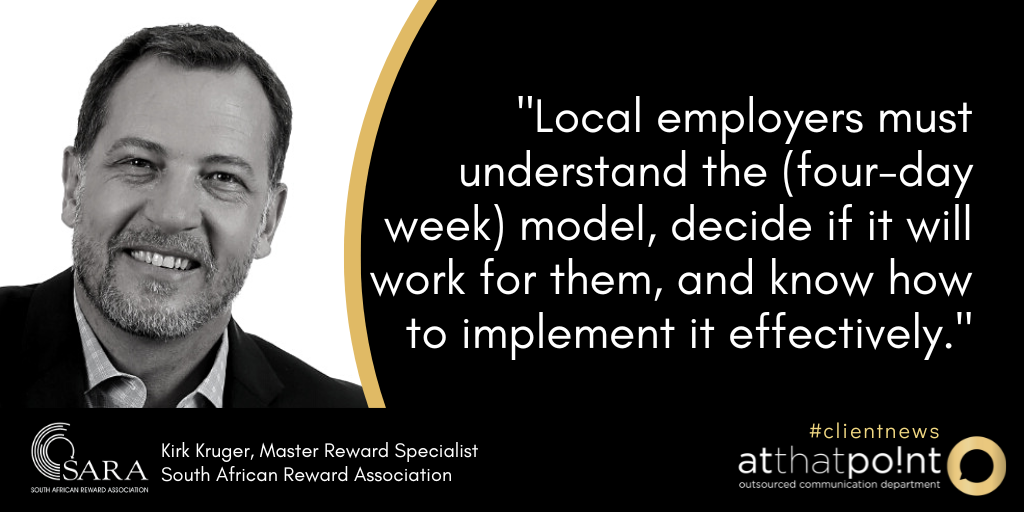 The concept of a four-day work week is attracting growing interest in countries around the world, including South Africa. "Local employers must understand the model, decide if it will work for them, and know how to implement it effectively," says Kirk Kruger, Master Reward Specialist with the South African Reward Association (SARA). How does it work? "The four-day work week should not be confused with the so-called compressed work week," advises Kruger. For the latter, employees receive the same remuneration and work the same hours per week. However, they work more hours during on-days to make up their weekly total hours worked. In contrast, a four-day work week means employees will work one day less in the week but the same number of hours per day as before. They will still receive their full salary and benefits. In essence they are being paid for outputs and not for hours worked. Why the interest? Both employers and employees are interested in the model because it promotes a healthier work-life balance, increases motivation and has a positive effect on productivity. On their in-week off-days, workers can take care of personal, family and lifestyle priorities, resulting in a better quality of life, mental and physical well-being, and more energy. Who will adopt it? "I don't think South Africa as a country or an economy is ready for this on a large scale and interested employers will want to test the waters before committing," says Kruger. Potential adopters are more likely to be niche organisations, such as smaller and medium-sized technology companies. Even then, they should take time to investigate its impact on their operations, possibly running a pilot programme first. How does it compare to WFH? "Since COVID ushered it in, work-from-home has gained momentum and I think it is here to stay" says Kruger. For now, he says WFH will remain the primary focus for employers due to the flexibility and location independence it offers and will overshadow the four-day model. However, as WFH becomes the norm, workers - especially those with scarce skills - may start looking for employers that offer both. Is it a good way to attract and retain employees? "Absolutely. Research shows a higher level of worker engagement, so there is good reason for employers to consider it as part of their employee value proposition," says Kruger. It can differentiate them with in-demand and self-motivated candidates who will deliver results whether they work four days or five. And it will help retain those who appreciate the flexibility it affords them. What do employers need to consider? It is critical that companies consider the model's impact on operational continuity and customer engagement. This will ensure they don't experience lapses in service delivery during peak hours due to insufficient personnel. "This requires a high level of engagement with employees to develop effective policies, including structured communication, active change management and collaborative corrective measures," says Kruger. Reviewing rewards With careful planning, employers can make the four-day work week a new highlight of their total reward strategy. "They should consult their reward specialist to ensure their leave, overtime, pay and benefits structure aligns with this new way of working" says Kruger. ENDS MEDIA CONTACT: Rosa-Mari Le Roux, [email protected], 060 995 6277, www.atthatpoint.co.za For more information on SARA please visit: Website: www.sara.co.za Twitter: @SA_reward LinkedIn: South African Reward Association Facebook: SARA – South African Reward Association 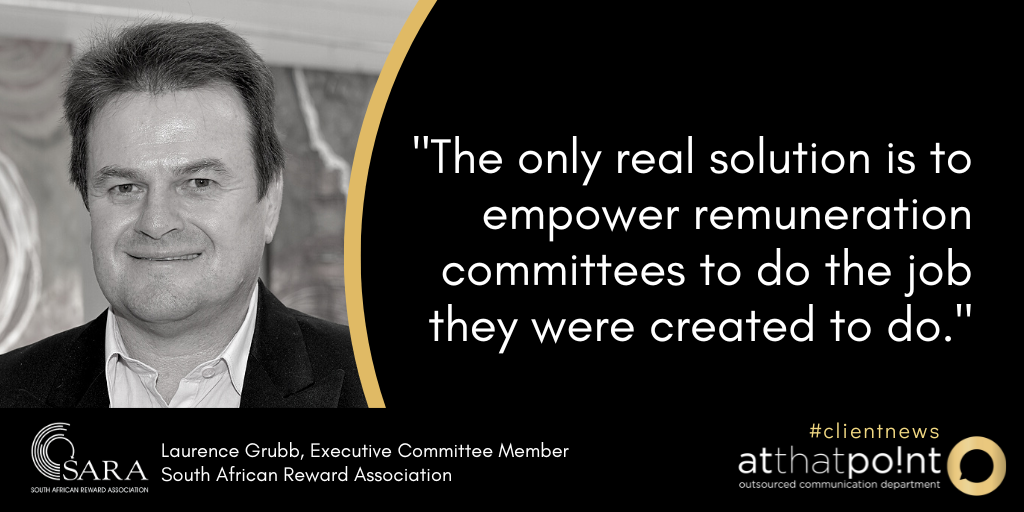 Stronger remuneration committees are the solution to rampant executive pay. This is according to Laurence Grubb, Master Reward Specialist and Executive Committee Member at the South African Reward Association (SARA). "We're seeing an imbalanced power dynamic between high-performing executives who associate significant rewards with the value they deliver and RemCos with structural expertise gaps that cannot assertively counter their demands," he says. Grubb suggests that alternative remedies are likely to do more harm than good. The danger of a binding vote The majority of South African businesses try to abide by the King IVTM code of corporate governance to achieve balanced and appropriate outcomes for executives, shareholders and other stakeholders. Yet, some CEOs, CFOs and executives continue to extract excessive remuneration from their companies. However, they have often built the enterprise from scratch or led it to significant growth, making them key to their company's success. So they may control the balance of power with a Board and Remco not willing to cross them. One suggested approach is to afford shareholders a binding vote that could deny gratuitous executive rewards, but Grubb says this is risky. "These leaders are the drivers of the business's growth and if their expectations are not met, they could move on and leave the Board to find a suitable successor, the impact of which will normally be a decline in the share price" says Grubb, noting that similar scarce talent might be impossible to find. Consequently, shareholders may end up shooting themselves in the foot. Rethinking the RemCo A better solution is to equip the RemCo with the necessary expertise to rationalise, negotiate and even restructure proposed packages in a way that satisfies of all parties. This requires that the committee augments its competencies with a deeper knowledge of current remuneration trends, industry standards and competitive best practices. To facilitate this solution, SARA is developing masterclass webinars and live sessions aimed at RemCo members, as well as other executive and non-executive directors, to enhance their understanding of executive remuneration. In addition, King IV suggests that the committee invites an external advisor to guide it in its duties. Executives will often hire remuneration consultants to help them determine the highest reward opportunities for their position. Their justification for greater compensation will be informed by data, industry benchmarks and practices and broader insights. RemCos without similar independent expertise will be left at a disadvantage. "In an ideal world, King IV might recommend a Master Reward Specialist as a standing member in all RemCos, allowing them to bring remuneration expertise, independent views and industry best practices to the negotiation," says Grubb. A real solution While most South African businesses have roped in runaway executive earnings, some executives continue to enjoy astronomical rewards. Many proposed solutions – like more onerous regulations or a binding vote for shareholders – may have unintended consequences which would prove to be negative in the long run. "The only real solution is to empower remuneration committees to do the job they were created to do," says Grubb. Most of all, they must be able to challenge the CEOs and executives who, up to now in some companies, have retained the balance of power in their struggle for greater rewards. ENDS MEDIA CONTACT: Rosa-Mari Le Roux, [email protected], 060 995 6277, www.atthatpoint.co.za For more information on SARA please visit: Website: www.sara.co.za Twitter: @SA_reward LinkedIn: South African Reward Association Facebook: SARA – South African Reward Association Dr Mark Bussin, EXCO member of the South African Reward Association (SARA), says that powerful international trends are changing the governance and remuneration landscape significantly.
“These trends are ushering in a profound shift in how we think about governance and remuneration, and smart boards and executive teams need to understand their implications,” he says. “Many of them are developing trends, so companies will need to keep their eye on the ball, and develop flexible strategies to respond to a shifting set of variables.” Dr Bussin says that while there are multiple trends, the following are the most important as they represent key directional shifts: Institutions and regulators flex their muscles Underlying many of these trends is the indisputable fact that both institutional investors and regulators are getting much more specific about what they want from companies in which they are invested. In particular, advisors like Lewis Glass and Institutional Shareholder Services are gaining more influence as they provide advice to large clients, and their agendas are thus gaining traction. Key agenda items include ESG and human capital measurement. ESG becomes a board matter Environment, social and governance (ESG) reporting has become mandatory globally. “The move to include non-financial metrics is positive, as it supplements traditional backward-looking and quantitative financial metrics with a new set that are essentially forward looking and qualitative,” he argues. “However, measurement is much more difficult and there’s no real objective way of doing it yet.” Human capital reporting grows up Another move to a more qualitative approach sees traditional reporting based on figures relating to gender and race being complemented by a deeper look at how the company is managing its talent. “We’re looking beyond numbers-based affirmative action to consider things like dignity, respect and, above all, inclusivity,” Dr Bussin says. Pressure to simplify remuneration Variable remuneration frameworks designed to drive performance have become so complex that that it has become virtually impossible to establish what anyone really earns, and so benchmarking cannot be done. Focus on the vertical and horizontal pay gap continues to grow The vertical pay gap—the CEO’s salary compared to that of the lowest paid worker—seems less and less useful as a measure. The top jobs are becoming more and more complex, and so attracting higher wages, while the lowest remain static. “The vertical pay gap will continue to widen and, in any event, redistributing the CEO’s salary to workers would make absolutely no impact,” says Dr Bussin. “For that reason, companies are moving towards paying a living wage (rather a minimum wage) to all employees as a way to make a real impact on people’s lives.” The horizontal pay gap—also known as the gender pay gap—remains a highly controversial issue. The global average is in the region of 25% whereas in South Africa it falls into the 10%-20% range. While the issue is not as clear cut as it might seem—other factors such as genuine parity of the work done and differing work/life priorities play a role—this is something that is receiving more focus. Work-from-anywhere trend raises significant issues Remote working has been growing in popularity over the past decade or so, strengthened by the recent lockdowns. On the governance side, this work style will demand a move from input-based to outcome-based performance management. Getting this right will surely only be a matter of time, but the tax question is more vexing: to whom would a consultant living in country A and working for multiple clients in various other jurisdictions pay tax? No firm answer to this question exists as yet. A related issue is the growing number of contractors, freelancers, part-timers and consultants: what kind and level of benefits are they entitled to receive? If the answer is none, then should they not be paid a premium? ENDS MEDIA CONTACT: Rosa-Mari Le Roux, [email protected], 060 995 6277, www.atthatpoint.co.za For more information on SARA please visit: Website: www.sara.co.za Twitter: @SA_reward LinkedIn: South African Reward Association Facebook: SARA – South African Reward Association Apart from the where, when and how of employee performance management, not much has changed since the emergence of COVID-19. This is according to Lindiwe Sebesho, Master Reward Specialist and Executive Committee Member at the South African Reward Association (SARA).
"This is because the key principles in performance management remain relevant in measuring and improving employee contribution to business performance or growth," she says. Performance philosophy Many organisations have become a mix of full time on-premises, fixed-hour staff and work-from-home (WFH) employees with flexible hours. So whilst how their performance is set, monitored and evaluated may be more complex, the need to manage performance remains key for business success. Leveraging technology, most employers are optimising various digital platforms that enable real-time, simple-to-use processes to ease the management of performance across the expanded enterprise. However, performance management principles remain focused on the need to set clear performance objectives and on holding ongoing feedback and feed-forward conversations between employers, workers and teams to optimise their contribution to delivering on corporate strategy. Therefore this process still aims to foster a continuous improvement ethic that focused individuals and teams on activities that drive business growth. Its outcomes are largely still ratings based and are used to inform fair, business-aligned skills development, reward and talent decisions such as succession planning. Key principles Organisations still need to clearly communicate their purpose, growth goals, ambition and strategy within a well-defined business context. Next, they must align employee efforts through personal, team, financial and non-financial objectives and key results (OKRs) that capture essential outcomes. As staff execute their duties, regular check-in conversations and real-time feedback enable development and continuous improvement of performance. Further, regular feedback and ratings should be administered, leading to formal annual evaluations that use an established rating scale linked to desired standards of contribution. These rating outcomes are then used as input for making reward and other talent-related decisions. "Whatever the circumstances, business must not become distracted from this proven approach to performance management even where different working arrangements have been adopted," says Sebesho. Underperformance With the country's economic downturn, organisations are eager to maximise resource output wherever possible. Accordingly there is a more concerted effort towards the proactive management of underperformance among staff. "While managers may have let underperformance slide in the past, they are now more focused On ensuring that every worker contributes to growth consistently," says Sebesho. As part of managing under-performance, it is key to understand the factors that negatively impact employee performance. The first is a lack of skills that could result from an ineffective education system and/or limited investment by employers in training and development. Assigning employees to roles that do not fit their competencies can also hamper optimal performance. Organisations that invest in skilling up workers and ensure employees are equal to their responsibilities can overcome this hurdle. The second is low employee morale and engagement, which can be caused by anything from the threat of retrenchments to rewards that do not align with worker values. The best solution is for management to establish a culture of open communication and engage with staff to determine the causes of poor morale. A show of concern alone can help reignite employee interest, although employers must follow through with solutions to maintain trust. Even workers with good morale may suffer from the third factor, a lack of motivation. This can be caused by societal conditions, such as social unrest or political instability, leading to personal problems, like poor mental or physical health. Employers can offset these obstacles with a comprehensive employee value proposition, additional mental and physical wellness support, and positive reinforcement through recognition of desired behaviours. Finally, a lack of resources may prevent employees from producing their best work. Low national economic growth, employer budget cuts or inadequate infrastructure, like transport and telecoms, can rob them of opportunities to work effectively. Employers should consider budgeting for critical resources that enable better productivity, and provide alternative working arrangements, like flexible hours or work-from-home solutions where the nature of jobs allow for such. They also need to provide technical and digital skills support where required. Enhanced performance In summary, WFH and hybrid models necessitated by the pandemic have created greater flexibility in the where, how and when of employee performance but have not necessarily changed the core principles of performance management which remain largely the same and employers must apply them consistently for the best results. Employers should therefore leverage technology to develop simple, real-time processes that enable performance management across expanded enterprise boundaries and maximise their people resources by minimising underperformance. "By acknowledging these trends, employers can maximise their workforce's performance and pursue their full growth potential despite the various operational challenges they face" says Sebesho. ENDS MEDIA CONTACT: Rosa-Mari Le Roux, [email protected], 060 995 6277, www.atthatpoint.co.za For more information on SARA please visit: Website: www.sara.co.za Twitter: @SA_reward LinkedIn: South African Reward Association Facebook: SARA – South African Reward Association The litany of serious governance failures laid bare in the published elements of the Zondo Report is a wake-up for South Africa, and remuneration issues are at the heart of the problem—and it’s solution, argues Dr Mark Bussin, Executive Committee Member of the South African Reward Association (SARA).
“In many instances, inappropriate remuneration is the coalface of corruption and incompetence in our state-owned enterprises (SOEs) because, after all, it boils down to money,” he says. “If we sort out remuneration, we are half way to putting our SOEs back on the path for growth, with tremendous knock-on benefits for the economy as a whole.” A major contributor to the problem comes from the way in which Ministers often appoint CEOs directly. Best practice as recommended in King IV’s Supplement on SOEs advises that Ministers only appoint CEOs from a shortlist compiled by the board. Bypassing the board reduces it—and its committees, including the remuneration committee—to a mere rubber stamp. A CEO that is appointed directly by the Minister is in a position to instruct the remuneration committee to approve unjustified and excessive pay hikes and bonuses as has been done in numerous SOEs. Another key issue that emerges from the Zondo Reports is the negative impact of cadre deployment. With political connections counting more than competence or ethics in many of these deployments, many remuneration-committee members are incompetent even if they are not actively corrupt. This means they cannot properly interrogate remuneration benchmark studies and ask the right kind of searching questions. “In fact, these incompetent but politically connected individuals can easily be led to a foregone conclusion,” he says. Dr Bussin believes that too many board members rely on their emoluments from a single board, inclining them to adopting a passive role when it comes to controversial issues, such as the perennially vexed question of executive pay. To preserve their independence, non-executive directors should not be allowed to earn more than 20% of their income from one company, he says. “The real culprit here is cadre deployment which simply loads overheads onto companies for scant benefit. One way to attack this problem would be simply to do away with individual SOE remuneration committees, and institute a central one under the auspices of National Treasury,” he says. A similar approach was evident in President Ramaphosa’s 2022 State of the Nation, which indicated that moves were afoot to implement a centralised shareholder model for SOEs to improve governance. Many commentators pointed out that in essence the plan suggests that the only way to bring the sector under control is to impose governance from above. A centralised remuneration committee would immediately eliminate the need for hundreds of expensive board posts—a quick win for cash-strapped SOEs. “More important still, this approach would re-establish the link between remuneration and executive performance and value delivered to the company. It would also make being a deployed cadre much less attractive to incompetent and corrupt individuals,” Dr Bussin concludes. “Centralising remuneration could be accomplished easily and the payoffs would be large and immediate.” ENDS MEDIA CONTACT: Rosa-Mari Le Roux, [email protected], 060 995 6277, www.atthatpoint.co.za For more information on SARA please visit: Website: www.sara.co.za Twitter: @SA_reward LinkedIn: South African Reward Association Facebook: SARA – South African Reward Association 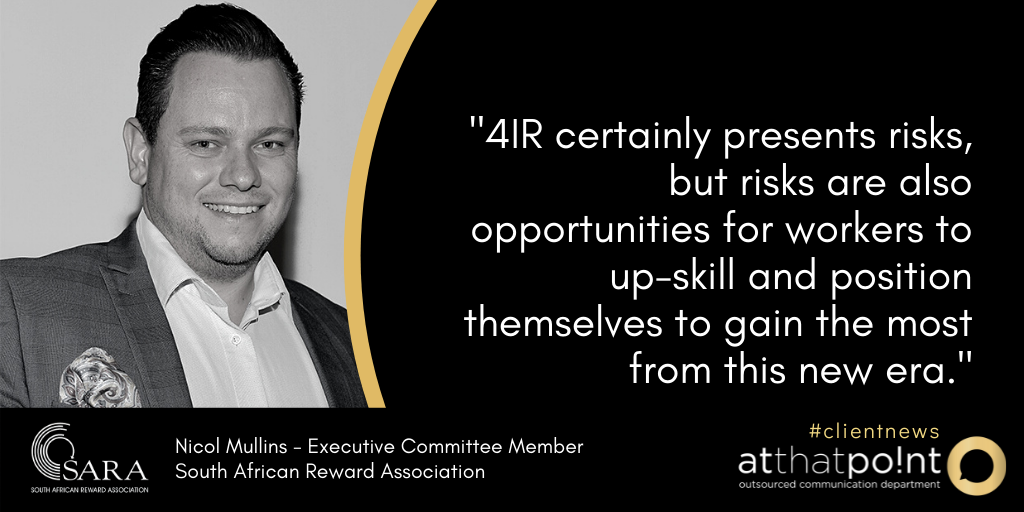 “The Fourth Industrial Revolution is about the acceleration of innovation and the velocity of disruption, and these two factors are creating disruption and along with this, new opportunities for business,” says Nicol Mullins, Chartered Reward Specialist and Executive Committee Member at the South African Reward Association (SARA). He observes that Covid-19 has served as a catalyst for the adoption of Fourth Industrial Revolution (4IR) technologies, along with forcing the development of new business models or the adaptation of existing ones. This trend is also redefining the approach employers take to remuneration and reward. A New Perspective on Reward “4IR certainly presents risks, but risks are also opportunities for workers to upskill and position themselves to gain the most from this new era,” says Mullins. This is especially true of the massive global move towards the virtual workplace, with many employees now working exclusively from home and connecting with their organisations, teams and managers digitally. Most organisations have pivoted rapidly to this new normal while others have not been as quick to transition. Either way, businesses are reviewing their strategic outlook based on a new set of challenges they face and resources now available to them due to the automation of repetitive, routine processes. “Reward strategies must likewise be adapted to complement this new paradigm and align with reimagined business strategies to contribute the highest value to their achievement,” says Mullins. Expanded Talent Possibilities An important effect of digitalisation is that talent sourcing and recruitment in a virtual world is not restricted by national borders. Or to humans. Instead, 4IR is blurring the boundaries between the physical, digital and biological, allowing organisations to draw from a worldwide pool of talent and specialisation. Resources no longer need to be situated locally but can contribute to corporate outcomes from anywhere on the planet. Because of this, reward strategies are shifting from an internal-only focus to include external parties as well. While companies have long followed a build, borrow or buy approach to talent planning and acquisition, borrowing is coming to the fore. “Organisations can more readily direct work to underutilised personnel without being constrained by departmental or divisional boundaries, resulting in greater efficiency and productivity,” says Mullins. Similarly, freelancers can be more seamlessly integrated into business processes to tackle activities that require professional attention, but not so frequently as to justify permanent staff. Better Reward Strategies As they embrace virtual workspaces, a more fluid talent mix and flexible work assignments, organisations must also determine how rewards should be structured for both internal and external staff requirements. For short term assignments, freelancers may be considered vendors who bill clients for their work and manage their own benefits and work-life balance. For long term contractors, especially those offering scarce or critical skills, a viable reward policy should be investigated. Employers may also consider hiring out specialist staff to other organisations, earning extra income when their workload is low. Embracing a sharing economy. How to design and implement remuneration and reward programmes appropriate to these dynamics falls squarely within the purview of the reward specialist. “Now is the ideal time for organisations to engage closely with their reward practitioners, whether inhouse or outsourced, and involve them more deeply in workforce planning and strategy,” says Mullins. ENDS MEDIA CONTACT: Idéle Prinsloo, 082 573 9219, [email protected], www.atthatpoint.co.za For more information on SARA please visit: Website: www.sara.co.za Twitter: @SA_reward LinkedIn: South African Reward Association Facebook: SARA – South African Reward Association Authored by: Dr Mark Bussin (Master Reward Specialist) and Yolanda Sedlmaier (Chartered Reward Specialist), Executive Committee Members of the South African Reward Association (SARA)
Before COVID-19 hit the world, the approach to reward was well defined. Organisations paid their employees a fixed basic salary, plus a set of additional benefits that effectively sweetened the pot. The fixed portion served to ensure workers received an equitable market-related income. The variable portion, on the other hand, extended into performance related rewards such as sales commissions and annual bonuses. Variable pay itself is categorised into two components. Short-term incentives (STIs) are attached to annual performance. Long-term incentives (LTIs), like company shares, are often contingent on employees meeting negotiated performance criteria. At the same time, employers were embracing experiential rewards, like wellness programmes, workplace comfort, flexitime, outstanding performance recognition and other non-financial benefits. The pandemic has turned this model on its head, forcing employers to consider different ways to attract, retain and motivate talented workers, and this without the resources previously at their disposal due to the wide ranging economic impact of the pandemic. How fixed pay has changed There have been no permanent changes in fixed pay policy itself. However, with so many staff being retrenched and businesses closing down, employees are more willing to accept the pay cuts their employers are forced to implement. It is obviously better to have less income than no income at all. What has changed is that employers are offering more options. These could include flexible working hours, paid or unpaid sabbaticals, or reduced hours for reduced pay. Something we are seeing, however, is a global trend towards lower variable pay in exchange for a small increase in monthly fixed pay. This is to provide the security employees need in the short term, although its adoption is not as prevalent in South African boardrooms, although we expect it will be in the near future. How variable pay has changed Variable pay is generally accepted to be that part of the reward package more readily tweaked to motivate employees and encourage better performance from them. Now, with almost all employers struggling to save jobs and keep their doors open, they face limited options. Most have managed to retain basic benefits, like medical aid and retirement funding. What has been more affected is incentives, such as sales commissions, overtime, annual bonuses, and even executive performance bonuses. With the global business slowdown, workers are unable to reach previously achievable targets, so employers aren’t earning the profits needed to reward them. To date, most organisations have been unable to innovate their reward programmes. They’ve been too busy trying to cut costs and negotiating with employees to choose between retrenchments or pay cuts. Unsurprisingly, workers generally opted for a lower salary over the uncertainty that they might be the ones left without a job. Productivity In spite of these dramatic events, many companies report an increase in productivity. This is due to flexible working arrangements allowing employees to save time and money not travelling to the office. It’s also an indicator that employees who are allowed to schedule their own time will do so responsibly. They can start working immediately and will often put in additional hours to make up for time spent on personal tasks. These might include caring for children, home schooling and homecare duties, or transporting them to school and back. Stay-at-home employees also insist they are working longer and harder than ever before. The effect of vaccination on rewards As vaccinations start rolling out in South Africa, we don’t expect this to have a direct or immediate effect on rewards. However, the more South Africans are vaccinated as a society, the quicker employees can return to work full time, and the sooner secondary effects will be realised, like the return of tourists to our shores. As this happens, we can expect a gradual economic recovery that should have a positive effect on employee reward packages. Two main trends In terms of their workforce, employers are focusing on two main concerns. The first is a complete review of their HR policies in relation to dealing effectively with and setting pay for workers who are not located on premises. These new policies are no longer founded on inputs and time spent at the place of business. Instead, they consider the outputs, outcomes and impact of these workers, and how to prepare managers to lead them remotely. The second is that we’re witnessing a major shift towards protecting employees’ mental health and well-being, and assisting them with professional loneliness. As the pandemic drags on, this will doubtless become a key element of every organisation’s reward strategy. ENDS MEDIA CONTACT: Rosa-Mari Le Roux, 060 995 6277, [email protected], www.atthatpoint.co.za For more information on SARA please visit: Website: www.sara.co.za Twitter: @SA_reward LinkedIn: South African Reward Association Facebook: SARA – South African Reward Association Whether or not executives earn too much and, if so, how to address executive remuneration practices, are two questions that continue to nag at global society.
“The pressure is even greater in South Africa, where inequality, poverty and unemployment are more pronounced,” says Martin Hopkins, Master Reward Specialist and past president of the South African Reward Association (SARA). The King IV Report on Corporate GovernanceTM recommends several approaches to governing executive reward. One is to give investors a greater say through remuneration voting. But what is it and what material effect does such a vote offer? What remuneration voting means King IV calls for executive remuneration in each company to be disclosed to investors through a remuneration report that has three parts: a background statement, an overview of the remuneration policy, and an implementation report. Further, shareholders are given the opportunity to pass a separate non-binding advisory vote on the policy and the implementation report. If 25% or more of the voting rights exercised by shareholders are against the remuneration policy or the implementation report, or both, the remuneration policy should specify the measures committed to by the board to respond to this voting outcome. These measures should include investor engagement and addressing objections and concerns, although King IV does not specify what format they should take or how they should be implemented. King IV is not enforceable by law; it is simply presented as a framework for good corporate governance. However, its influence is “given teeth” when its recommendations are adopted by regulators with the power to enforce them. This is true of the Johannesburg Stock Exchange (JSE) Listing Requirements, which makes certain of its practices mandatory for publicly traded companies. So, within the JSE's purview, remuneration voting is compulsory, not optional. Even so, a non-binding advisory vote by shareholders has no legal effect on the adoption of the remuneration policy or the implementation report. It simply allows the organisation's management and remuneration committee to gauge sentiment towards their provisions. That said, the vote serves as a powerful barometer of the company’s governance quality and of investor confidence. Should shareholders have more power? The effect of giving shareholders more say in how much executives earn is widely debated. They have a strong economic interest in good governance as well as a moral obligation towards equitable pay. At the same time, giving investors too much power may unduly affect the ability of the Board to govern and management to operate the company effectively. Investor activism can be a powerful force for good, but ultimately the directors need to balance the needs of many stakeholders and make balanced decisions that are overly influenced by any single voice. Measures to provide for increased shareholder power are currently being debated by various interest groups, with measures such as a binding vote on the remuneration policy and/or the implementation report and the so-called “two strike” rule being considered. The binding vote means that the directors must adhere to the provisions of the approved policy and may not apply their discretion to vary the policy terms without shareholder approval. The “two-strike” rule would mean that in the case of two successive votes of more than 25% against the remuneration policy or implementation report the members of the Remuneration Committee would have to step down from the committee for at least two years, and be replaced by other members of the Board. There is diverse practice on remuneration voting in developed and developing countries, with a binding vote on the remuneration policy at a 50% threshold in place in the UK, which is viewed as being reasonably effective, and non-binding voting practices in the US and Canada. Australia has adopted the “two-strike rule” with limited success. Reward perspective Hopkins notes that while there is a great deal of emotion regarding executive pay it's also important to recognise that it is not at all clear that executive pay can be dramatically reduced without damage to the ability of business to generate shareholder value and create jobs. Market forces mean that any one company within a country can’t dramatically reduce executive pay without immediate loss of skills and leadership. If regulations in a country systemically reduce all executive pay then mobile highly skilled executives may well move to other countries which have no such regulations. Many companies aspire to pay their executives in line with their contribution to business profitability and reward them against agreed performance milestones. King IV was developed to reign in excessive remuneration practices, not prevent companies from fairly rewarding employees for their contribution and performance. “Organisations should also look at the other end of the pay fairness equation, with increasing focus on the pay gap and how this should be measured and addressed”, says Hopkins. Together with caution in respect of executive pay, measures to increase the pay of the lowest paid staff, whilst remaining economically competitive is another important reward factor to consider. “This is a complex issue”, concludes Hopkins. Business leadership cannot disregard calls from many quarters to address these issues, but must also seek to balance the views of multiple stakeholders with the pressing need for economic growth and job creation. ENDS MEDIA CONTACT: Rosa-Mari Le Roux, 060 995 6277, [email protected], www.atthatpoint.co.za For more information on SARA please visit: Website: www.sara.co.za Twitter: @SA_reward LinkedIn: South African Reward Association Facebook: SARA – South African Reward Association |
Archives
March 2023
Welcome to the South African Reward Association newsroom.
Categories
All
|


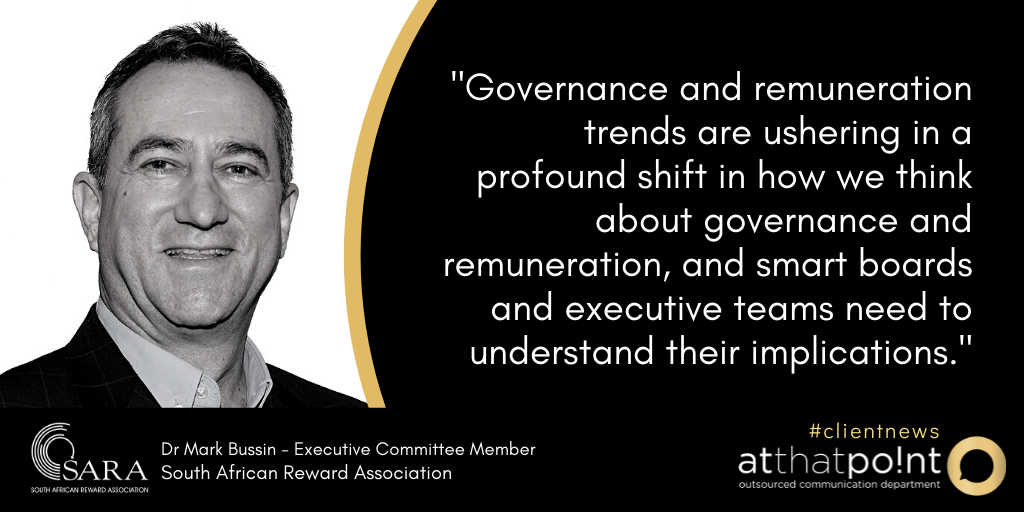
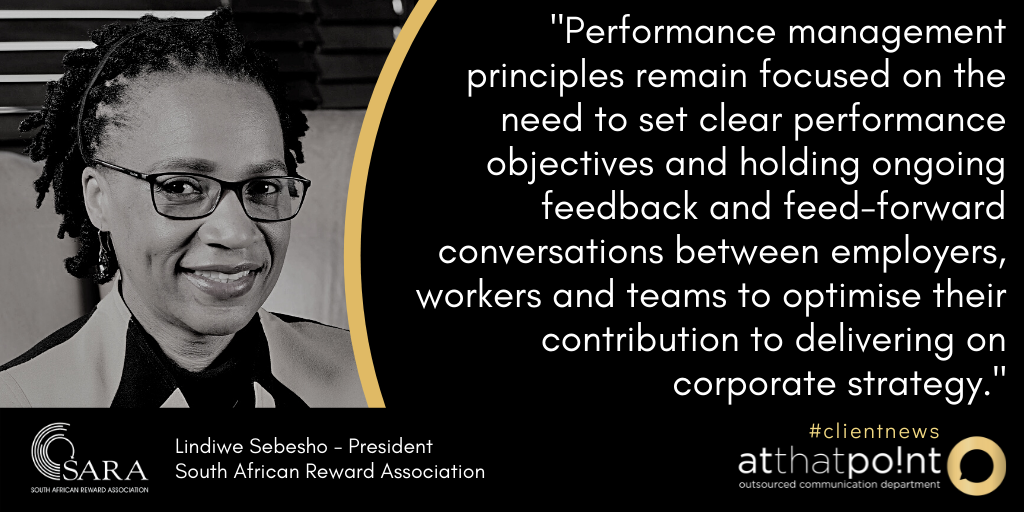
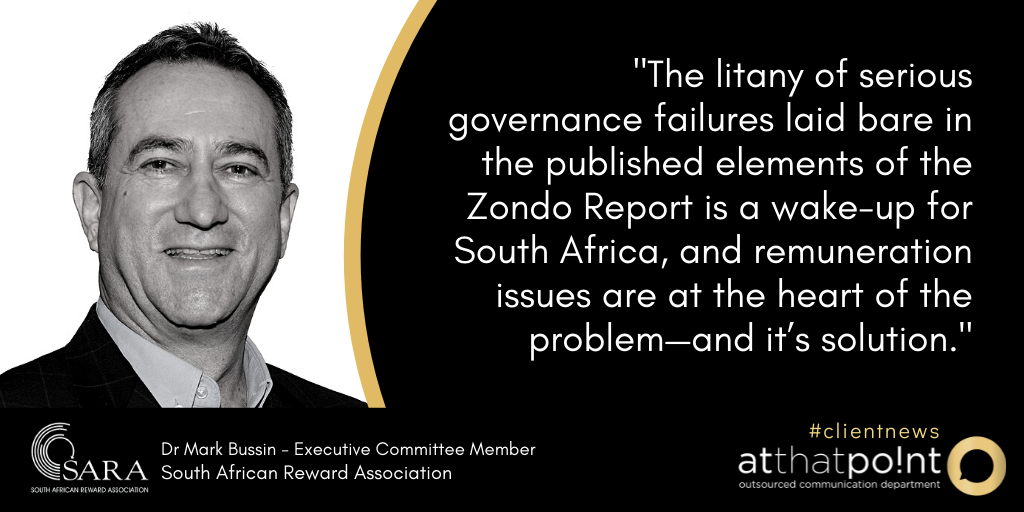
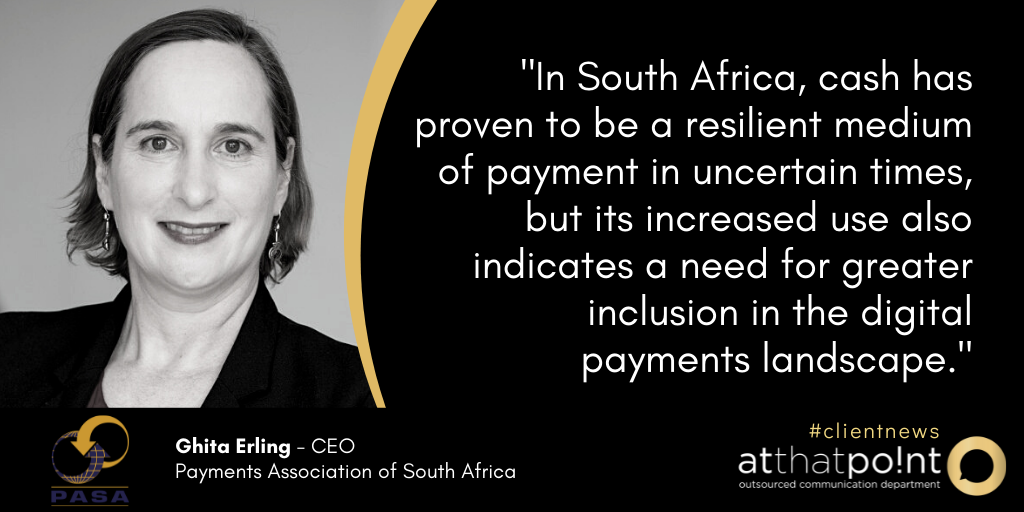
 RSS Feed
RSS Feed